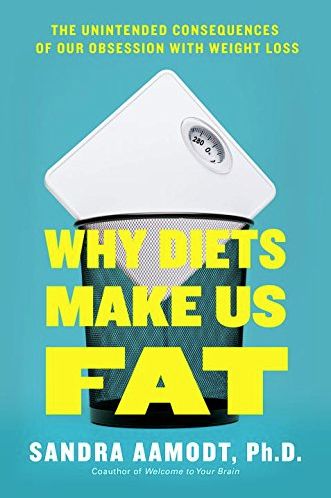This weekend the New York Times attacked the topic of “Why You Can’t Lose Weight on a Diet”. The article, written by neuroscientist Sandra Aamodt led with, “The problem isn’t willpower. It’s neuroscience. You can’t – and shouldn’t – fight back.”
Dr. Aamodt is the author of the forthcoming book “Why Diets Make us Fat” and is herself a proponent of abandoning diets in favor of behaviors that will improve our health and extend our lives.
I had the good fortune to be featured along with with Sandra Aamodt on today’s KQED Forum radio program in San Francisco with host Michael Krasny. The purpose of the episode was to analyze research showing that diets do not result in long-term weight loss and how they might even lead to weight gain.
The precipitating publication that spawned interest in this topic was a recent article in the journal Obesity that followed “The Biggest Loser” competitors 6 years after their appearance on the show. As you can probably guess, 6 years out weight loss was not a foregone conclusion for the Biggest Losers.
Since the show’s finale, the 14 Biggest Loser participants analyzed in the study had regained 70 percent of the weight they initially lost. And perhaps even more interesting, these losers were burning approximately 500 less calories per day than other people their age and size.
The neuroscience tie-in that Sandra Aamodt is looking at questions what we know as the set point. The set point is that target weight your body is going to fight to keep you at, no matter how hard you try to get below it. And dieting that pushes your weight below your body’s set point results in you burning fewer calories and ultimately messing with your body’s metabolic rate.
One challenge lies in quantifying your “set point” or your body’s “metabolic rate”. These aren’t numbers on a scale or values in your blood that can be easily measured. Sandra and her team are instead analyzing the powerful interplay between cyclical feasting and fasting, one’s genetic makeup and ultimately their weight outcomes.
Her findings may surprise fad diet adherents: diets that require you to cut calories below your baseline needs have the opposite of their intended effect – they result in lower metabolic rates which ultimately impede weight loss and may even contribute to net weight gain.
So what’s a dieter to do? Here are a few takeaway messages from today’s show:
- Embrace intuitive eating – learn to listen to your true hunger and satiety cues when making food choices
- Don’t just blame your genes – genetics may play a role in obesity, but so does environment and lifestyle factors
- Get moving – regular physical activity not only increases your energy output but it also can boost your resting metabolism, meaning you burn more calories at rest if you exercise than if you don’t
- Learn from other losers – check out the National Weight Control Registry, a cohort of “Successful Losers” – those who have lost 30 pounds and kept it off for more than a year. See what they have in common and learn from their experiences.
- Ditch the diets – no published data has ever found a particular diet or eating pattern to be the one that promotes sustainable weight loss; the diet industry is a $20 billion+ megalith that will do everything to convince you of the opposite!
So time to throw out your diet books and get back in tune with your body. Cutting calories too low doesn’t lead to sustainable weight loss and actually lowers your metabolic rate.
For more info on the tie in between our brain and our bodies, check out Sandra’s TEDTalk on Why Diets Don’t Work and listen to today’s Forum program from KQED here.

